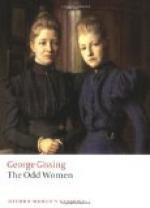‘There now,’ he said, ’we have talked in the approved five o’clock way. Precisely the dialogue I heard in a drawing-room yesterday. It goes on day after day, year after year, through the whole of people’s lives.’
‘You are on friendly terms with such people?’
‘I am on friendly terms with people of every kind.’ He added, in an undertone, ‘I hope I may include you, Miss Nunn?’
But to this she paid no attention. She was looking at Monica and Miss Barfoot, who had just risen from their seats. They approached, and presently Barfoot found himself alone with the familiar pair.
‘Another cup of tea, Everard?’ asked his cousin.
‘Thank you. Who was the young lady you didn’t introduce me to?’
‘Miss Haven—one of our pupils.’
‘Does she think of going into business?’
’She has just got a place in the publishing department of a weekly paper.’
’But really—from the few words of her talk that fell upon my ear I should have thought her a highly educated girl.’
‘So she is,’ replied Miss Barfoot. ‘What is your objection?’
‘Why doesn’t she aim at some better position?’
Miss Barfoot and Rhoda exchanged smiles.
’But nothing could be better for her. Some day she hopes to start a paper of her own, and to learn all the details of such business is just what she wants. Oh, you are still very conventional, Everard. You meant she ought to take up something graceful and pretty— something ladylike.’
’No, no. It’s all right. I thoroughly approve. And when Miss Haven starts her paper, Miss Nunn will write for it.’
‘I hope so,’ assented his cousin.
’You make me feel that I am in touch with the great movements of our time. It’s delightful to know you. But come now, isn’t there any way in which I could help?’
Mary laughed.
‘None whatever, I’m afraid.’
‘Well,—“They also serve who only stand and wait."’
If Everard had pleased himself he would have visited the house in Queen’s Road every other day. As this might not be, he spent a good deal of his time in other society, not caring to read much. or otherwise occupy his solitude. Starting with one or two acquaintances in London, people of means and position, he easily extended his social sphere. Had he cared to marry, he might, notwithstanding his poverty, have wooed with fair chance in a certain wealthy family, where two daughters, the sole children, plain but well-instructed girls, waited for the men of brains who should appreciate them. So rare in society, these men of brains, and, alas! so frequently deserted by their wisdom when it comes to choosing a wife. It being his principle to reflect on every possibility, Barfoot of course asked himself whether it would not be reasonable to approach one or other of these young women—the Miss Brissendens. He needed a larger income; he wanted to travel in a more satisfactory way than during his late absence. Agnes Brissenden struck him as a very calm and sensible girl; not at all likely to marry any one but the man who would be a suitable companion for her, and probably disposed to look on marriage as a permanent friendship, which must not be endangered by feminine follies. She had no beauty, but mental powers above the average—superior, certainly, to her sister’s.




